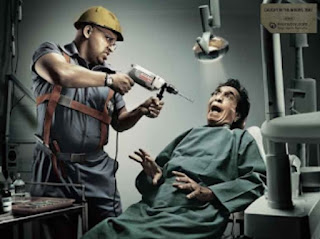Fear of the dentist
Tips to overcome the fear of the dentist.
Overcoming fear of the dentist and the importance of healthy eating in childhood.
Dental offices have always aroused fear in many patients. However, there are effective strategies to overcome these fears, and dentists can help through pharmacological means, such as relaxing treatments. It is also advisable to take certain precautions before visiting the dentist, such as avoiding exciting foods and getting a good night's rest the night before. Attending the appointment at a convenient time to avoid generating additional stress and staying calm, asking questions, and resolving doubts, also contributes to overcoming fear.
Conscious sedation has emerged as an aid in dental treatments that generate patient stress or anxiety. This type of sedation is performed with the assistance of a team of anesthesiologists. Before treatment, a medical history is taken, and guidelines for sedation are established. During the procedure, the patient remains conscious and cooperative, allowing for a more relaxed experience. In addition, conscious sedation enhances the analgesic effect of local anesthesia, giving the patient a sense of gentleness and brevity of treatment.
It is important to keep in mind that there is a widely described pathology known as odontophobia, which refers to an irrational and persistent fear of dentists. This fear may be based on previously unknown experiences or treatments that generated insecurity. Several tips can be followed to overcome or reduce this fear, such as making dental visits a habit, avoiding delaying dental problems, and finding a dentist you trust. Becoming informed about how the dentist can help overcome fears is also crucial.
Here are five tips for overcoming the fear of the dentist:
- Do not arrive early: Attending the appointment at the exact time is advisable to avoid waits that can increase anxiety.
- Establish a gentle contact: To gain confidence, you can start with simple treatment at the first appointment, such as a cleaning or a diagnosis, leaving more complex treatments for later.
- Agree on a stop signal: Before starting treatment, it is advisable to inform the dentist about the anxiety and establish a signal (e.g., raising the hand) to stop the procedure if needed.
- Listen to relaxing music: The patient can wear headphones and listen to the music they choose to relax during treatment.
- Consider sedation of sedation: In extreme cases, sedation methods, either pharmacological or by inhalation of nitrous oxide, can be evaluated.
How can a person become dental-phobic?
An ingrained fear of dentists can develop for a variety of reasons, including unpleasant experiences lived directly, the influence of acquaintances or family members who have had bad experiences, threats as a form of negative manipulation during childhood, or having witnessed a bad dental experience that has left a strong subconscious impression.
Characteristics of people with dental phobia:
They show communication barriers and do not initially reveal their true character or personality.
As a form of protection, they can manifest themselves in different ways in front of the professional, such as withdrawal, aggressiveness, or shyness. In reality, they feel fear of the unknown.
Their objectivity may be conditioned by details that, for others, maybe insignificant, such as terminology, looks, voice tones, and behaviors.
It is recommended to focus on treatment solutions rather than detailing procedures, as a detailed explanation can create confusion and aggravate the problem.
Treatment plans and budgeting should be flexible to avoid creating more anxiety.
In general, they may exhibit childish behaviors if the negative experiences occurred during childhood, as they mentally relive those situations.
Treatment options:
Treatment with psychological care and behavioral support to control anxiety, with the assistance of a behavioral psychologist.
Gradual and frequent treatment, with short visits daily or every other day, to progressively get used to the dental experiences and discard fears.
Gaseous sedation with regulated nitrous oxide and the assistance of an anesthesiologist or specialized dentist to obtain substantial relaxation and perform basic treatments.
Intravenous sedation is performed in appropriate operating rooms and under the supervision of a licensed anesthesiologist, reserved for cases of extreme phobia. This technique involves administering anesthetic drugs with anxiolytic, hypnotic, and analgesic properties.


Comments from dental offices are welcome but without spam.
ReplyDeleteThank you
Thank you for commenting, but all links are considered Spam.
ReplyDeleteThank you